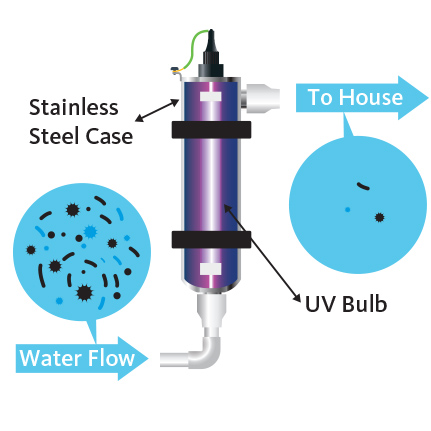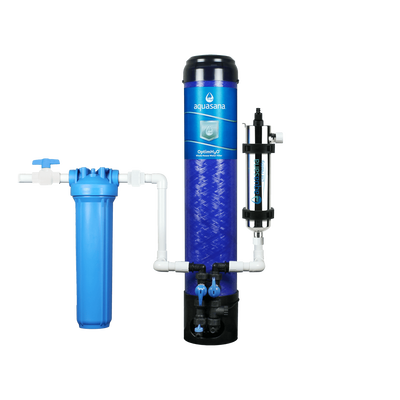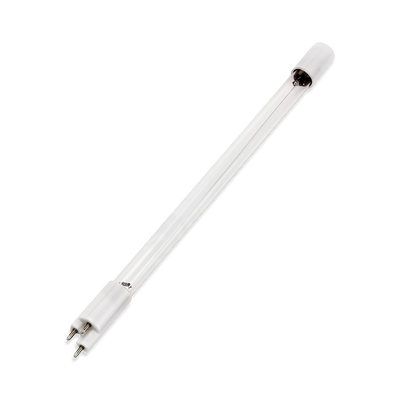Water filtration systems are not one-size-fits-all. For the best filtration, invest in a system that filters for all the unwanted contaminants that are likely to be found in a home’s water. Aquasana specializes in designing products that utilize all the best filtration methods in one unified system. When bacteria and viruses threaten your water, there’s no better protection than a UV water filter.

Why Use a UV water filter?
There are a whole lot of nasty contaminants beneath the “microorganism” umbrella. The term “micro-organism” or “microbe” refers to any living organism in your water. This includes bacteria, viruses, parasites, and cysts. Some commonly known microbial contaminants are; legionella, giardia, and E.coli. Ingesting these can cause problems ranging from violent gastrointestinal illness to pneumonia.
Disinfection is a huge part of any water treatment process. That’s because microbial contaminants like parasites, bacteria, and viruses are common and dangerous.
Water that is not disinfected by a city or water supplier, as with private wells, is vulnerable to these dangerous contaminants. With chemically treated water, there is a constant push and pull because of the harshness of the chemicals being used.”
It takes an unsavory amount of chlorine or chloramine to effectively disinfect water. Plus, there are chlorine resistant microns out there. If you want your water to be microbe-free, you’ve got three options; drink pool water, boil all of your water, or use UV water purification (hint: pick UV).
How Does a uv water filter Work?
People typically link ultraviolet light to tanning beds or even nail salons. Hark back to those elementary school days and remember that ultraviolet light comes from the sun. Its wavelengths are of a higher frequency than visible light. UV photons have higher energy, and can cause ionization in atoms. This means that UV radiation can break chemical bonds and damage cells so that they can’t reproduce.
Fun Fact: Many of us have experienced the cell-damaging power of UV rays. Sunburns are a result of exposure to UV light radiating from the sun. When that power is safely harnessed, as with our UV bulb, it kills 99.99% of microbial contaminants without the use of chemicals!
While UV light does come from the sun, there are a number of ways to generate it artificially. One of the most common ways to produce it is by passing an electric current through vaporized mercury or other gas. While this might sound high tech, the practice is so common that most people sit beneath a tube of the stuff everyday—fluorescent lights first produce UV rays before re-emitting visible light via their fluorescent coating.
 It’s actually fairly simple. Water is pumped into a chamber which houses an ultraviolet bulb. The ultraviolet rays produced are fine-tuned to a frequency that best attacks microbes. These rays pierce the cell walls, damaging contaminants and their DNA so that they can’t reproduce. This renders dangerous contaminants, such as E.Coli and giardia, completely harmless.
It’s actually fairly simple. Water is pumped into a chamber which houses an ultraviolet bulb. The ultraviolet rays produced are fine-tuned to a frequency that best attacks microbes. These rays pierce the cell walls, damaging contaminants and their DNA so that they can’t reproduce. This renders dangerous contaminants, such as E.Coli and giardia, completely harmless.
The use of UV filtration can be found at all levels of water treatment. Not only is it known to be an effective way to eliminate the dangers of bacteria and viruses, it does so without tainting the water with harsh chemicals.
advantages of uv water purification
UV filtration is a great way to make your water safer, so take a look at some of the main reasons why it’s so popular:
- Eliminates Microorganisms: UV water filters are incredibly effective, as they eliminate up to 99.99% of microorganisms such as bacteria and viruses.
- Safety: UV filters do not use any dangerous chemicals that can have negative health effects
- Easy Installation/Replacement: Aquasna’s UV water filters easily attach to our whole house systems, and replacement is as simple as changing a light bulb once a year.
- Environmentally Friendly: Unlike some water filtration methods, UV water purification doesn’t waste any water through the process and emits no by-products.
disadvantages of uv water purification
Although UV filtration is a great way to improve the safety of your water, there are a couple additional things to know about this purification method:
- Doesn’t Remove All Contaminants: UV water filters are great at eliminating microorganisms, but you’ll still need an additional system to remove other contaminants such as metals, salts, and chlorine. For this reason, we recommend using a UV filter alongside a whole house system.
- Water Needs to Be Clear: Unfortunately, UV filters can only treat clear water because the ultraviolet rays need to be able to reach the microorganisms without being obstructed by particles. Although this isn’t an issue for most, it likely won’t be effective for well-water that’s especially murky.
- Requires Electricity: Because UV water filters require electricity, they won’t work in the unfortunate case of an emergency where the power goes out.
Overall, a UV water filter is a great addition to any home — but you should make sure it’s an addition to a complete filtration system rather than solely relying on the UV water filter to purify your water.
Who Can Benefit from UV Filtration?
While the disinfecting powers of a UV water filter can benefit anyone, there are certain populations who are especially likely to have bacteria and viruses compromise their water:
- Private Well Owners – Because private well water is not disinfected by a water treatment facility, it is at risk of microbial contamination. Parasites, bacteria, and viruses all inhabit untreated water. The risk is especially high for wells located near large animal feeding operations.

- Recipients of a “Water Boil Warning” – City water treatment facilities can issue a “boil warning”, in which consumers are told to boil their water before drinking. When that happens, it’s possible that water quality tests revealed a microbial infection of some kind. Outbreaks can always reoccur. So, it’s important to get informed about just what’s in the water and why that supplier’s disinfection protocols aren’t working.
- Immunocompromised – Those suffering from immune disorders or receiving treatment which suppresses the immune system can benefit tremendously from filtration systems that include UV filtration. UV filtration is as much as 99.9% effective at eliminating the threat of microbial contamination, which can mean real peace of mind for those who would be especially devastated by contracting a bacterial or viral infection.
- Families – Households with young children or elderly adults might want to consider UV filtration. Anyone who would be especially impacted by contracting a bacterial or viral illness can protect themselves by adding the disinfecting power of ultraviolet light to their filtration system.
INSTALL A UV-EQUIPPED AQUASANSA WATER FILTER
If you’re considering a Whole House Water Filter to get clean water from every faucet, think about opting for an upgraded version that comes equipped with a UV Water Filter. An optional add-on for our Whole House systems, the UV filter is the last piece of the filtration puzzle offering total home protection against bacteria and viruses. The Aquasana UV Water Filter kills 99.99% of viruses, bacteria, and chlorine resistant cysts like cryptosporidium and giardia.
The UV bulb is easy to replace and lasts an entire year so you don’t have to deal with frequent swaps. Install a UV water filter in your home to start enjoying cleaner, safer, and better-tasting water from every faucet.

